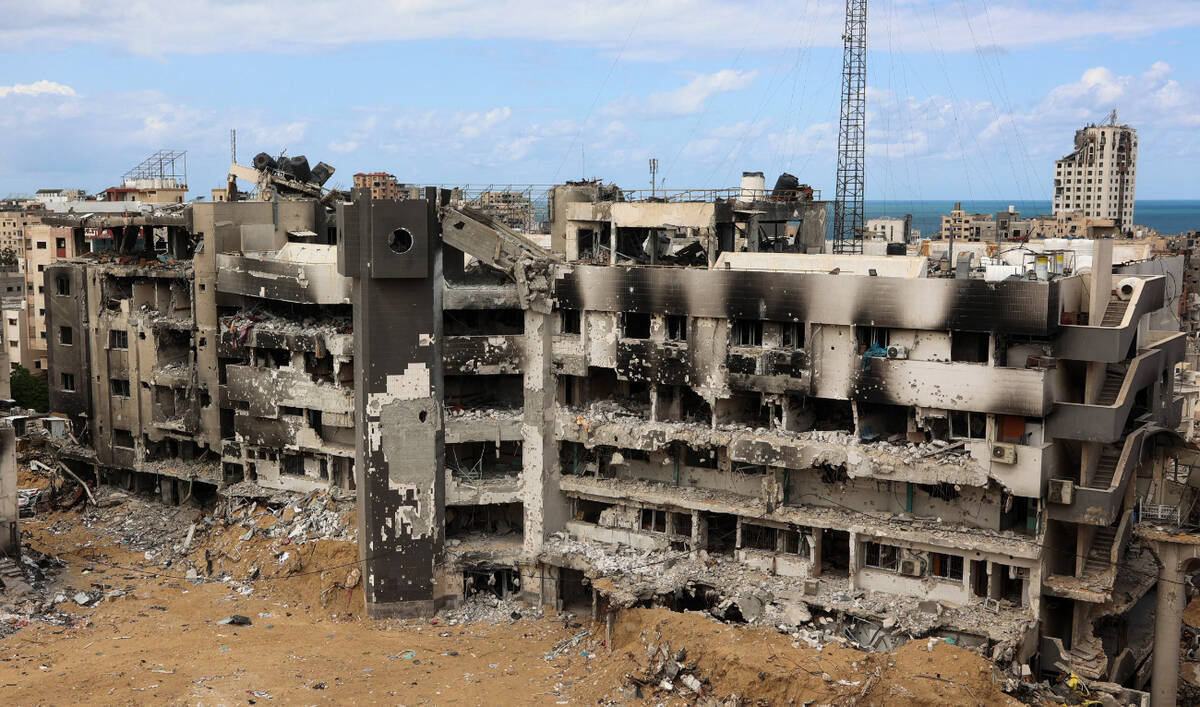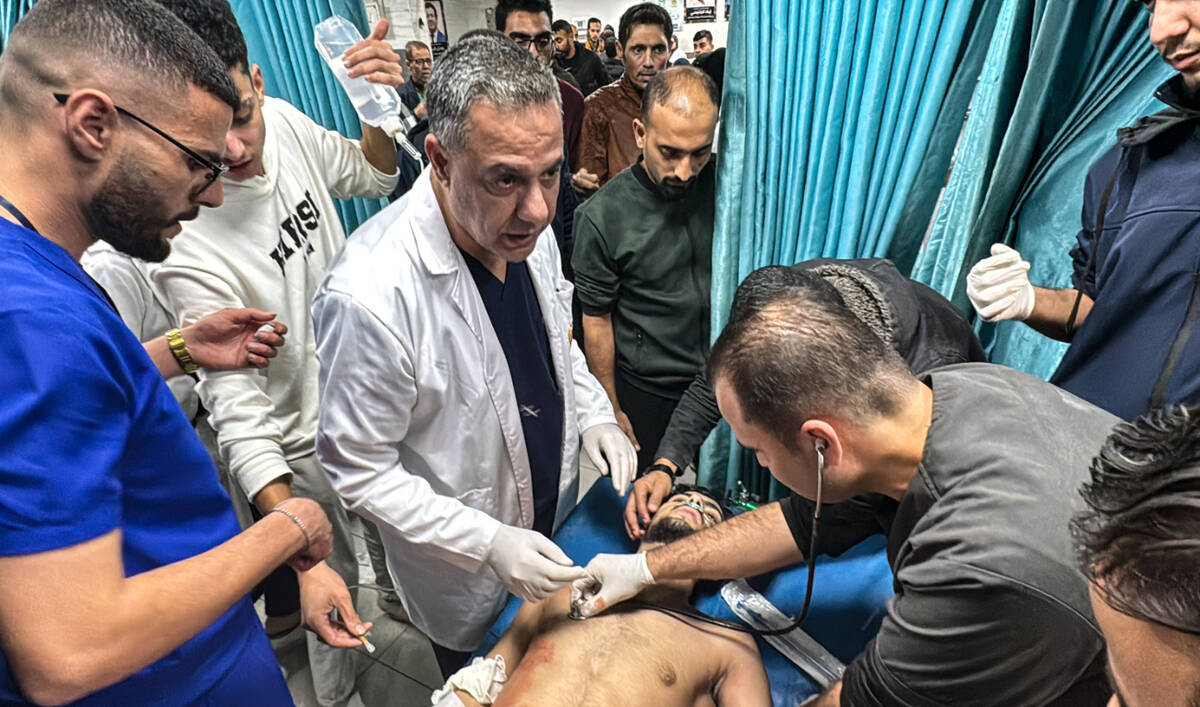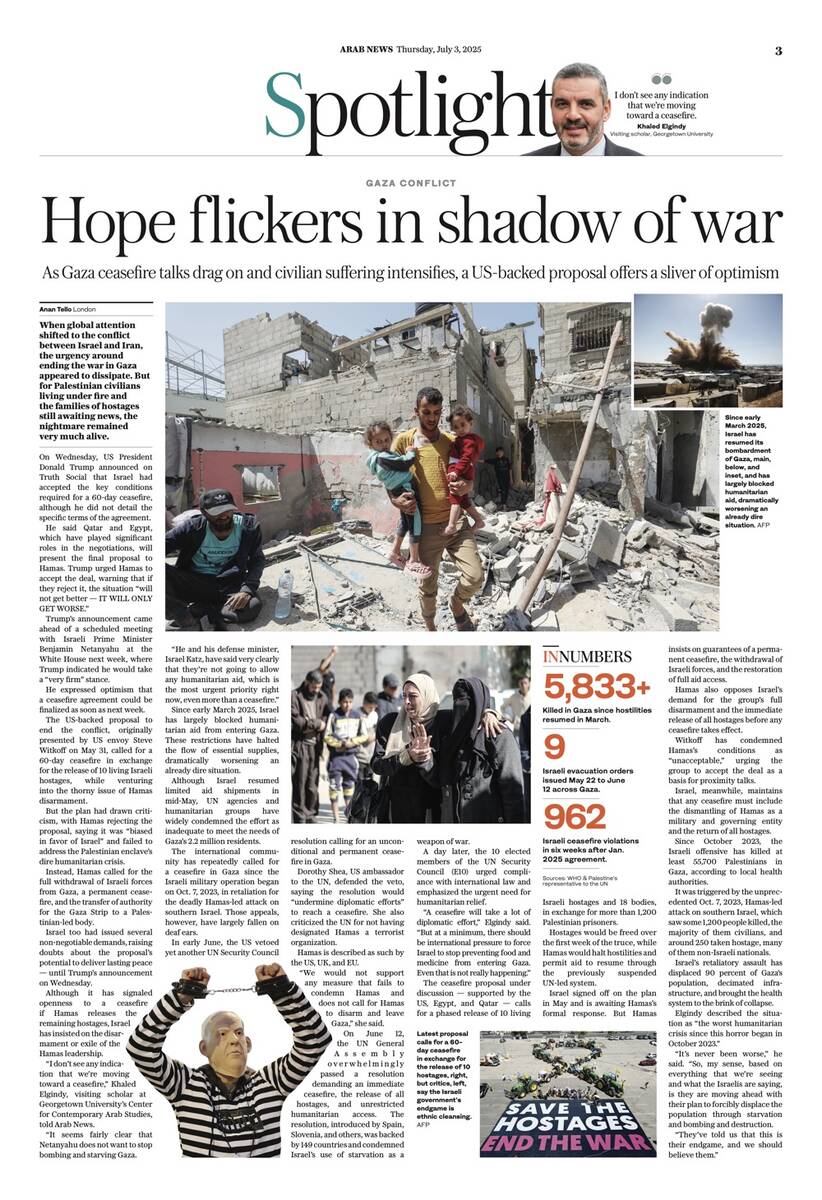LONDON: Rights groups say Israel is deliberately targeting Gaza’s health system, with at least 160 Palestinian medics currently detained having been seized from hospitals. Recently released doctors have described targeted attacks and systematic abuse.
Healthcare Workers Watch, a Palestinian watchdog, reported in February that 162 medical staff are being held by Israeli authorities, including 20 doctors and some of Gaza’s most senior physicians.
The whereabouts of 24 healthcare workers are unknown after they were forcibly removed from hospitals during Israel’s military operation, which began on Oct. 7, 2023, following the deadly Hamas-led attack on southern Israel that triggered the conflict.
Muath Alser, director of Healthcare Workers Watch, said the detention of medical workers represented a violation of international law, which had exacerbated civilian suffering by stripping Palestinians of essential medical expertise and care.
“Israel’s targeting of the healthcare workforce in this manner is having a devastating impact on the provision of healthcare to Palestinians, with extensive suffering, countless preventable deaths, and the effective eradication of whole medical specialities,” Alser told The Guardian.

Israeli soldiers stand by a truck packed with bound and blindfolded Palestinian detainees in Gaza on Dec. 8, 2023. (AP)
The destruction of Gaza’s health infrastructure has been widely documented. A December 2024 report by the UN Human Rights Office revealed that the enclave’s healthcare system had been brought to the brink of collapse by repeated raids.
Hospitals have been damaged — both directly and indirectly by Israeli airstrikes and combat operations — putting staff and patients at risk. More than 1,000 health workers have been killed, according to the UN.
On Sunday, an Israeli airstrike destroyed parts of Al-Ahli Arab Hospital, Gaza City’s last fully functional hospital. Witnesses said the strike destroyed the intensive care and surgery departments.
Israel said it targeted the hospital because it contained a “command and control center used by Hamas,” but did not provide any evidence. Governments worldwide condemned the attack, including Saudi Arabia, which described the bombing as a “heinous crime.”
IN NUMBERS
- 1,057+ Palestinian health workers have been killed in Gaza since October 2023.
- 25% Gaza’s wounded with life-changing injuries who require ongoing rehabilitation.
(Source: OCHA)
Amid growing concerns over Israel’s compliance with international humanitarian law, which is designed to protect hospitals, clinics, ambulances, and their staff, Gaza’s health sector is struggling to meet the overwhelming demand.
According to the World Health Organization, just 16 of Gaza’s 36 hospitals remained partially operational as of January, with fewer than 1,800 beds available for tens of thousands of patients.
Dr. Rik Peeperkorn, the WHO representative for the West Bank and Gaza, has warned that “the health sector is being systematically dismantled,” citing shortages of medical supplies, equipment, and personnel.
Since October 2023, at least 50,900 Palestinians have been killed and more than 115,688 injured, according to Gaza’s health authorities. As of September 2024, a quarter of the wounded had suffered life-changing injuries.
The WHO also verified that 297 healthcare workers in Gaza had been detained by the Israeli military since October 2023 but had no details on who was still being held. Healthcare Workers Watch reports that 339 have been detained.

The whereabouts of 24 healthcare workers are unknown after they were forcibly removed from hospitals during Israel’s military operation. (AFP)
Several organizations have shared testimonies from recently released Palestinian doctors describing systematic raids, arrests, and allegations of torture.
Physicians for Human Rights–Israel, in a report released in February, said many medical workers had been seized while on duty and held for months without charge under Israel’s Incarceration of Unlawful Combatants Law, which allows indefinite detention without evidence.
Several accounts from released detainees include details of physical violence, sexual abuse, verbal insults, and degrading treatment.
For instance, Dr. Khaled Alser, 32, a surgeon arrested at Nasser Hospital, said: “On the day of my arrest, the army ordered the evacuation of the hospital. There was a battalion outside, and they forced us to strip in front of everyone and walk naked for about 30 meters.”
He said detainees were left naked for hours before being moved to overcrowded rooms in houses, where they were handcuffed with plastic zip ties for five days and interrogated.
“I was next to my medical colleagues when they took them, tortured and beat them, and later released some while arresting others,” he added.
FASTFACTS
- As of Sept. 24, 2024, at least three Palestinian physicians have died in Israeli custody.
- Orthopedic surgeon Dr. Adnan Al-Bursh died under torture in Israeli custody in May 2024.
(Source: MAP)
Twenty of the 24 medical workers visited by PHRI lawyers said they were arrested while on duty in direct violation of international laws protecting medical staff from interference.
In addition, prison authorities employed brutal interrogation methods. One 60-year-old emergency coordinator and ambulance driver said he was tortured with loud music, beatings, and threats.
“I was interrogated in the ‘Disco Room’ for a week, where the volume was always deafening,” he said. “They beat me so badly during one session that my tooth filling fell out.
“They poured cold water on me, struck me on the head with a cellphone, and beat me half to death. They threatened to harm my family and parents.”

Israel said it targeted Al-Ahli Arab Hospital on Sunday because it contained a “command and control center used by Hamas,” but did not provide any evidence. (AFP)
Similarly, a 38-year-old nurse said he was suspended by his wrists from the ceiling, his legs forced backward, and left in that position for hours.
“They humiliated me and spat on me,” he told the PHRI. “During the interrogation in Ofer Prison, they extinguished cigarettes on my head and poured coffee over me. I was brutally beaten.”
International humanitarian law strictly prohibits physical or psychological abuse during interrogations. Article 32 of the Fourth Geneva Convention bars acts that cause physical suffering or extermination of protected persons, including medical personnel.
“Health workers should be protected to do their work,” a WHO spokesperson told Arab News. “Anyone in detention must have their human and legal rights respected.”

A 38-year-old nurse said he was suspended by his wrists from the ceiling, his legs forced backward, and left in that position for hours during interrogation at Ofer Prison. (AFP)
Israel has accused Hamas and other militant groups of using hospitals as command centers. Under international humanitarian law, hospitals lose protected status if they are used for military purposes.
The deliberate denial of food was also said to be commonplace in Israel’s detention facilities.
The report said all 24 medical professionals interviewed suffered severe malnutrition, as prison authorities provided inadequate meals — in terms of quality and quantity — that also ignored preexisting health conditions like diabetes, causing lasting damage.
One doctor described the food as lacking vitamins and a balanced diet, weakening the detainees’ immune systems. PHRI confirmed this by consulting a clinical nutritionist for an expert assessment of conditions at Ofer Prison near Ramallah.
Compounding health issues from violent treatment and extreme malnutrition in custody, the testimonies highlighted a severe lack of medical care, even for those with preexisting conditions.

Hospitals have been damaged — both directly and indirectly by Israeli airstrikes and combat operations — putting staff and patients at risk. (AFP)
The Israeli Prison Service, in a statement to the American broadcaster CNN following the release of PHRI’s report, denied knowledge of abuse against Palestinian medical workers inside its facilities and claimed it acted according to local law.
In the same vein, the Israeli Defense Forces told the German broadcaster Deutsche Welle it “operates in accordance with international law and does not detain medical workers due to their work as such.”
It denied withholding medical treatment or food and said that “any mistreatment of detainees, whether during detention or interrogation, is strictly prohibited and constitutes a violation of Israeli and international law, and of IDF regulations.”
The IDF added that any mistreatment would be investigated.
International human rights organizations and UN agencies have documented Israel’s actions in Gaza, accusing it of war crimes.
Amnesty International said in December that “Israel has carried out acts prohibited under the Genocide Convention, with the specific intent to destroy Palestinians in Gaza.”

In October 2024, a UN Commission on Detainee Treatment report found that Israeli security forces deliberately killed, detained, and tortured medical personnel, targeted medical vehicles, and tightened the siege on Gaza, restricting permits for medical treatment.
“These actions constitute the war crimes of wilful killing and mistreatment and of the destruction of protected civilian property and the crime against humanity of extermination,” it added.
Balkees Jarrah, acting Middle East director at Human Rights Watch, said in August that Israel’s “mistreatment of Palestinian healthcare workers has continued in the shadows.”
She called for a thorough investigation into “the torture and ill-treatment of doctors, nurses, and paramedics, including by the International Criminal Court.”
A lawyer representing Dr. Hussam Abu Safiya, director of Kamal Adwan Hospital, whose detention by Israeli forces in December sparked international condemnation, said after visiting him in Ofer Prison that the doctor had been tortured, beaten, and denied medical treatment.
In addition, the accounts in PHRI’s report align with findings by other media and rights organizations, including a 2024 Human Rights Watch report that documented similar abuses. It said the detentions have worsened Gaza’s health crisis by limiting access to essential care.

A lawyer representing Dr. Hussam Abu Safiya (C), whose detention by Israeli forces in December sparked international condemnation, said after visiting him in Ofer Prison that the doctor had been tortured, beaten, and denied medical treatment. (AFP)
Likewise, interviews with The Guardian and Arab Reporters for Investigative Journalism revealed testimonies from eight senior Gaza doctors, detailing torture, beatings, starvation, and humiliation during months of detention.
Some believe they were singled out for extreme violence because they were doctors.
Dr. Issam Abu Ajwa was in the middle of performing emergency surgery on a patient at Al-Ahli Arab Hospital in central Gaza when Israeli soldiers came for him.
Describing his ordeal, he said: “One of the senior interrogators had given instructions that because I was a senior consultant surgeon, they should work hard to make sure that I lost (the use of my hands) and became unable to perform surgery.”
He added that he was handcuffed 24 hours a day, and interrogators used planks with chains to restrain his hands for hours at a time. “They said they wanted to make sure I could never return to work.”
None of the eight senior doctors were given an explanation for their detention, the report says. All were released without charge after months in custody.

Relatives and medics mourn by the body of Palestinian doctor Hani Al-Jaafarawi, Gaza’s ambulance and emergency teams chief during his funeral at Al-Ahli Arab hospital on June 24, 2024. (AFP)
In a statement to DW, the Israeli military rejected the allegations raised by The Guardian, saying: “During the fighting in the Gaza Strip, suspects of terrorist activities were arrested.”
It added: “The relevant suspects have been taken for further detention and questioning in Israel. Those who are not involved in terrorist activity are released back to the Gaza Strip as soon as possible.”
PHRI’s report found that Palestinian medical workers were primarily questioned about Israeli hostages, tunnels, hospital structures, Hamas activity, and fellow physicians — rarely about criminal activity or substantive charges.
The report said the interrogations appeared focused on “intelligence gathering rather than investigating alleged security offenses.”
It noted that after months in detention, most medical personnel were never formally charged and were denied legal representation.

Israeli military patrols near Al-Shifa Hospital compound in Gaza City on November 22, 2023. (AFP)
Naji Abbas, director of PHRI’s Department for Prisoners and Detainees’ Rights, said: “Through the testimonies, through our visits, we started to understand that the doctors were arrested mainly for collecting information.
“When you hear a doctor saying that he was forced to draw a map of the hospital, when he was asked about his colleagues … you can understand that there is a pattern of questioning … fishing for information,” he told Democracy Now, a left-leaning US news program.
In a statement within the February report, Abbas called the “unlawful detention, abuse, and starvation of Gaza’s healthcare workers” a “moral and legal outrage.”
He added that “medical professionals should never be targeted, detained, or tortured for providing life-saving care,” and demanded Israel “release all detained medical personnel immediately,” urging the international community to “demand accountability.”





































